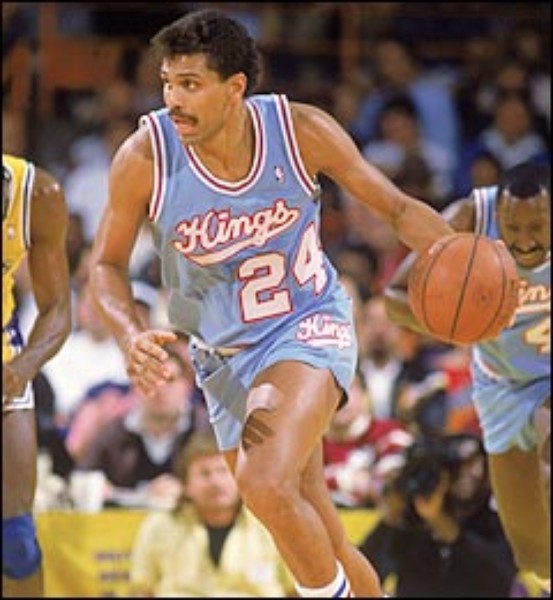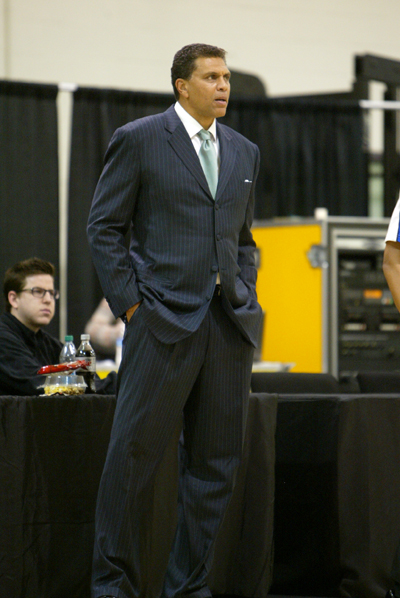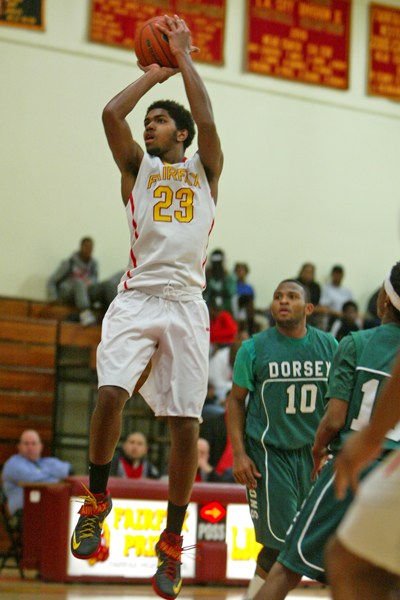
After playing basketball at Inglewood High School and UNLV, Reggie Theus played 13 seasons in the NBA.

Today, Reggie Theus can be seen in action coaching the D-Fenders in the NBA’s Developmental League. The D-Fenders play their home games at the Toyota Center, on the Lakers practice court. Photo by Jason Lewis

Reggie Theus Jr. is following in his father’s footsteps. The younger Theus is a standout basketball player at Fairfax High School, and he is being recruited by several colleges. Photo by Jason Lewis
By Jason Lewis
Sentinel Sports Editor
Reggie Theus is not just one of the greatest basketball players to come out of this area, he is a link to a time period when kids played outside, played multiple sports, worked on their skills instead of their athletic abilities, and socially, had to figure out how to coexist with white people.
With children today, all of that sounds foreign, as most kids do not play outside, they stick to one sport where athletic ability trumps skills, and being around white people is not a big deal.
Theus’ early childhood was spent in Los Angeles, around 118th Street and Main, near Gompers Junior High School. He learned how to swim at Athens Park, and he played sports at Daniel Freedmen Elementary School, as well as 118th Elementary School.
Theus would eventually become a basketball star, but growing up football and baseball were his best two sports. In football he played wide receiver and quarterback, and in baseball he played 3rd base and pitcher. Many of his friends told him that he would have made a better baseball player than basketball player. That time period was different from today, as athletes now usually stick to one sport because many coaches want to train them year round.
“Back in those days we played all sports,” Theus said. “I was on two different baseball teams at one time. Different football teams. Those were days when you’d meet up on Saturdays and it was like guys who go to the gym and play pickup ball. We would go to the park, pick sides, and play football.”
Which ever sport Theus would have chosen, he had the abilities to play because he was always outside with his friends competing various athletic challenges.
“You develop hand eye coordination and you develop different things by your early childhood, and the things that you do for fun,” Theus said. “We used to run hurdles in my driveway over the trash cans. I have a scar on my leg today from doing that. Those things that we did as kids helped us develop as athletes. I remember just dribbling the ball up and down my driveway, just speed dribbling, and it was just fun for us. We would try to defend each other, and the driveways were narrow, so you would learn how to manipulate a very narrow driveway with people guarding you.”
Things have drastically changed for young athletes since the 1970s.
“Well we’re different,” Theus said. “In our day we all played multiple sports. But I think that today there is an emphasis on nutrition and weight training. Back in the day we never lifted weights. I grew up thinking that if you lifted weights you were going mess up your jump shot. But of course we know that is not true. I think that today the athletes are physically better, but don’t necessarily have the skill level that we had growing up.”
While the modern basketball player can jump out of the gym, Theus feels that during his day, it was all about skills.
“When I was in high school dunking was not allowed. So if you weren’t allowed to dunk, which is one of the reasons why I think that the skill levels have changed from a few generations back, if dunking was not allowed, you had to have a better floor game. You had to have a better jump shot. You had to pay attention to all of those things more so than playing above the rim and just being athletic. Dunking was not even a high priority for us. But now it has to be a high priority. Now it is so sensationalized that kids grow up wanting to dunk the ball before they shoot jumpers.”
Theus once showed his son, Reggie Theus Jr., who is a standout basketball player at Fairfax High School, a VHS tape of him playing for the Chicago Bulls when they played against the Boston Celtics. He had a career high 48 points in that game. Theus recalls watching the tape with his son, and was surprised by his son’s reaction to the video.
“I came down court and hit a nice shot,” Theus said. “Then I came down court again and made a nice pass. I got another jump shot. So he turns to me and says, ‘Dad, when are you going to dunk the ball like Vince Carter?’ I turned it off and told him to get out of here. You’re not ready yet.”
It’s just a different day. Not just in sports, but socially as well. Theus attended Monroe Junior High School, which fed into Morningside High School, which was predominantly black. But in the fall of 1971, he was a member of the first integrated class at Inglewood High School, which at the time was predominantly white. Not surprisingly there were racial issues in the beginning.
“We had our battles,” Theus said. “We had tension. We were invading their space. We were forced to go to that school, so there was a lot of growth on both parts that had to happen. I watched ‘white flight.’ I watched the school turn from predominantly white to predominantly black.”
Even though it was a struggle at times, it helped shape Theus as a person.
“I thought it was a great experience for me, one of the greatest of my life because it exposed me to a different culture, and to different people, and to doing things differently,” Theus said. “There were a few pretty serious things that happened in high school that were racially motivated, but we survived it, and I think that all of us are better for the move because we were exposed to different people.”
There was a major cultural change at the school, and on the basketball team as well. Before black students enrolled at Inglewood, the basketball team was not very good. But by Theus’ junior year, with the infusion of black players, the team was drastically different, and they started to win. By the time his senior year rolled around, Inglewood had one of the best high school basketball teams in the area.
According to Theus, 1975 was one of the best years that the greater Los Angeles area has ever seen in high school basketball, as to his memory, about 10 players from this area made it to the NBA. Players such as Roy Hamilton (Verbum Dei High School, UCLA), David Greenwood (Verbum Dei High School, UCLA), Kiki Vandeweghe (Palisades High School, UCLA), and James Wilkes (Dorsey High School, UCLA). Theus’ biggest rival in high school was Palos Verdes High School’s Bill Lambert, who went on to play college basketball at Notre Dame before winning two championships with the Detroit Pistons.
After high school, Theus had several colleges around the nation recruiting him, and he chose to play at UNLV, who had an uptempo style of play under legendary head coach Jerry Tarkanian.
During his college career, UNLV only lost a total of 12 games in three seasons, and they advanced to the Final Four during Theus’ sophomore season, where they lost to North Carolina by one point. UNLV’s high scoring offense produced 110 points per game one season, and that was without the 3-point line. As a junior Theus was named to the All-American team.
During the 1979 NBA Draft Theus was selected 9th overall, which was extremely impressive for an underclassman to go that high. He was selected by the Bulls, and he was an instant star in the NBA, as he led all rookies in scoring with 16.3 points per game and he was the runner up for the league’s Rookie of the Year award.
Theus appeared in the All-Star Game twice with the Bulls, in 1981, when he averaged 20.2 points and 6.3 assists per game, and in 1983, when he averaged 23.8 points per game.
Theus missed playing with Michael Jordan by 15 minutes, as he puts it. Fifteen minutes before the trade deadline in 1983, the Bulls traded him to the Kansas City Kings. The Bulls drafted Jordan that summer.
Theus ended up playing for 13 seasons in the NBA, and he is only one of seven players in NBA history to score more than 19,000 points while recording more than 6,000 assists.
Since retiring from the NBA, Theus has had a successful career in television broadcasting and as a head coach. From 2005-2007 he coached at New Mexico State University, where he led them to consecutive winning seasons and an appearance in the NCAA Tournament. He moved on to become the coach of the Sacramento Kings in 2007, and he is currently the head coach of the Los Angeles D-Fenders in the NBA’s Development League.
Theus is also a family man, as he and his wife have sent their eldest daughter through college at UC Irvine, where she was on the volleyball team, their son is being recruited by a number of colleges to play basketball, and they have a daughter at Redondo Union High School, who is also a volleyball player.
Theus has been a great member of Los Angeles’ African American community, and he certainly has great pride for where he came from.






